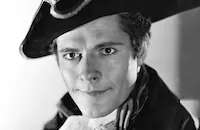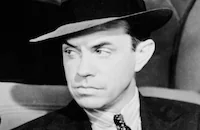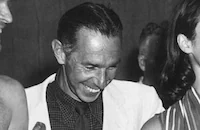Sea Devils

Brief Synopsis
Cast & Crew
Ben Stoloff
Victor Mclaglen
Preston Foster
Ida Lupino
Donald Woods
Helen Flint
Film Details
Technical Specs

Synopsis
When "ladies man" Mike O'Shay, a seaman in the Coast Guard, arrives at a new base, he collides with pretty librarian Doris Malone and, unaware that she is the daughter of Petty Officer William "Medals" Malone, begins a flirtation with her. Rebuffed by Doris, Mike ventures to "Sadies," the local tavern, where he brawls with Medals over a teenage girl. After the fight, Mike receives aid from a now sympathetic Doris, who is then surprised by the return of her equally battered father. When Medals, who has picked clean-cut, ambitious Steve Webb to marry Doris, sees Mike, he throws the seaman out of his house. He then has him assigned to his ship, while at the same time encouraging Steve to propose to Doris. On the night that Steve is to "pop the question," however, Mike slips away from the ship and sneaks over to the Malones' house. Steve, seeing Doris with Mike, goes back to the ship before proposing, but covers for Mike when Medals inquires about his whereabouts. Medals then tries to keep Steve off a three-week ice patrol, to which Mike is also assigned, but Steve tells him that he would rather fight fairly for Doris and insists on joining the crew. During an iceberg detonation test, Mike, who has been forced by Medals to perform the most gruelling tasks, starts a brawl with Medals, which causes the escape boat to unmoor. When the other seamen realize that the boat has drifted away, Steve tries to stop the blast but is caught in the explosion. Badly injured, Steve is flown to the base hospital, and Mike is called for a court-martial. Shamed by his behavior both on the iceberg and at Mike's trial, Medals resigns from the Guard, while Mike is jailed on the ship's brig. After Steve dies of his injuries, Doris announces to Medals that she and Mike are going to marry. That same night, a hurricane rips through the area, and both Medals and Mike, hearing the call of duty, force their way back to the ship, which has been called by a floundering yacht. After rescuing the yacht passengers, Medals sacrifices himself to save Mike and goes down with the boat. Many years later, Mike nicknames his son "Medals" in honor of his feisty father-in-law.

Director
Ben Stoloff
Cast

Victor Mclaglen

Preston Foster

Ida Lupino

Donald Woods
Helen Flint

Gordon Jones

Pierre Watkin
Murray Alper

Billy Gilbert

Paul Guilfoyle

Charles Lane

Vinton Haworth
Crew
Joseph August
Samuel J. Briskin
John L. Cass
Kenny Holmes
J. Roy Hunt
Edmund Joseph
Lieut. H. C. Moore
Van Nest Polglase
Arthur Roberts
Darrell Silvera
Edward Small
Edward Stevenson
John Twist
John Twist
Sidney Ullman
Vernon Walker
Frank Wead
Frank Wead
Roy Webb
P. J. Wolfson
P. J. Wolfson

Photo Collections
Film Details
Technical Specs

Articles
Sea Devils (1937) - Sea Devils
A former vaudevillian, pugilist, and soldier (he had during his World War I service with the Irish Fusiliers acted as provost marshal of Bagdad), McLaglen saw no shame in signing on for a rote programmer such as Sea Devils. Having turned fifty in March of 1936, McLaglen enjoyed a generous Fox salary, a ranch in the San Joaquin Valley, and a garrulous but congenial social life as the founder of a Hollywood polo club and motorcycle club. The broad-shouldered, 6'3" actor is well-cast as Coast Guard captain Bill "Medals" Malone, who attempts to save his only child (Ida Lupino) from marrying sailor Preston Foster. A former wrestler turned Broadway song-and-dance man, Foster was himself enjoying the jump to leading man status after villainous turns in Michael Curtiz' Doctor X and Mervyn LeRoy's I Am a Fugitive from a Chain Gang (both 1932). Foster had been third-billed in The Informer as the head of the Irish underground, his role greatly rewritten from Liam O'Flaherty's source novel to make Foster's character an inarguably heroic figure.
Shot under a variety of working titles, which included Coast Guard, Coast Patrol and Rough, Ready and Handsome, Sea Devils is a standard military romance film on par with To the Shores of Tripoli (1942) and An Officer and a Gentleman (1982), all of which pit a crusty career soldier against a brash young cadet. Like McLaglen, leading lady Ida Lupino had come to Hollywood by way of England; at the age of 14, she had won the lead role in Allan Dwan's Her First Affaire (1932) when she accompanied her actress mother, Connie Emerald, to the audition. Put under contract to Paramount in 1933, Lupino was as unhappy with the roles offered by the studio as she was in frequent loan-outs, to Columbia for Let's Get Married (1937), to Pickford-Lasky for The Gay Desperado (1936) and to RKO for Sea Devils, the first of three films she made for director Benjamin Stoloff. Lupino would eventually quit Paramount for Warner Brothers, where she flourished in a run of hard-edged roles; she turned to filmmaking with Not Wanted (1949) after she took over the film from ailing director Elmer Clifton.
Bookended by a pair of impressive special effects setpieces, Sea Devils also benefits immeasurably from a core of memorable supporting performances. Ralph Byrd, star of Republic's Dick Tracy serials and features, appears here as a seaman during a court martial scene while Charles Lane turns up briefly as a judge. Given more to do is Dwight Frye, cast as the wireless operator of a burning steamship who goes mad attempting to radio for help. Like Preston Foster, Frye came to Hollywood by way of Broadway and sub-specialized in savant-like characters who usually came to a bad end: the fly-eating Renfield in Tod Browning's Dracula (1931), the mentally defective Herman Gleib in Frank R. Strayer's The Vampire Bat (1933), the murderous aerialist Flandrin in Roy William Neill's The Circus Queen Murder (1933) and a pair of evil henchmen in James Whale's Frankenstein (1931) and Bride of Frankenstein (1935). Before he is knocked senseless by an anesthetic blow from gruff rescuer McLaglen, Frye's histrionics have a semi-comedic, effeminate aspect yet they anticipate with eerie prescience newsman Herbert Morrison's agonized reaction to the Hindenburg airship disaster in May of that year.
Sea Devils was co-written by Frank "Spig" Wead, a decorated Navy aviator who turned to writing after a debilitating accident in 1926 ended his career as a Navy pilot. A novelist, playwright and author on books about the history and mechanics of aviation, Wead wrote his first screenplay, for MGM's The Flying Fleet, in 1928 and was nominated twice for the Academy Award - for Victor Fleming's Test Pilot and King Vidor's The Citadel (both 1938). A decade after his 1947 death, Wead's long-time friend John Ford spun Wead's life story as The Wings of Eagles (1957), starring John Wayne.
Producer: Edward Small
Director: Benjamin Stoloff
Screenplay: John Twist, Frank Wead, P.J. Wolfson
Cinematography: Joseph August, J. Roy Hunt
Art Direction: Van Nest Polglase
Music: Roy Webb
Film Editing: Arthur Roberts
Cast: Victor McLaglen (Bill 'Medals' Malone), Preston Foster (Michael 'Mike' O'Shea), Ida Lupino (Doris Malone), Donald Woods (Steve Webb), Helen Flint (Sadie Bennett), Gordon Jones (Puggy), Pierre Watkin (Commander), Murray Alper (Brown), Billy Gilbert (Policeman)
BW-88m.
by Richard Harland Smith
Sources:
Screen World Presents the Encyclopedia of Hollywood Film Actors by Barry Monush (Hal Leonard Corporation, 2003)
Pappy: The Life of John Ford by Dan Ford (Da Capo Press, 1998)
Ida Lupino: A Biography by William Donati (University of Kentucky Press, 2000)
Dwight Frye's Last Laugh by Gary J. Svehla, Susan Svehla and Jim Coughlin (Midnight Marquee Press, 1997)
The World War II Combat Film: Anatomy of a Genre by Jeanine Bassinger (Wesleyan University Press, 2003)
Lost in the Fifties: Recovering Phantom Hollywood by Wheeler W. Dixon

Sea Devils (1937) - Sea Devils
Quotes
Trivia
Notes
The working titles of the film were Coast Guard, Coast Patrol and Rough, Ready and Handsome. RKO borrowed Donald Woods from Warner Bros. for the production. Hollywood Reporter production charts and news items add Kathryn Marlowe and Fern Emmett to the cast, while Motion Picture Herald's "The Cutting Room" adds Alan Curtis and William Corson. The participation of these actors in the final film has not been confirmed. According to Hollywood Reporter, Victor McLaglen was scheduled to perform in a radio version of the story, which was to be broadcast on February 12, 1937 at the Hollywood Hotel.















